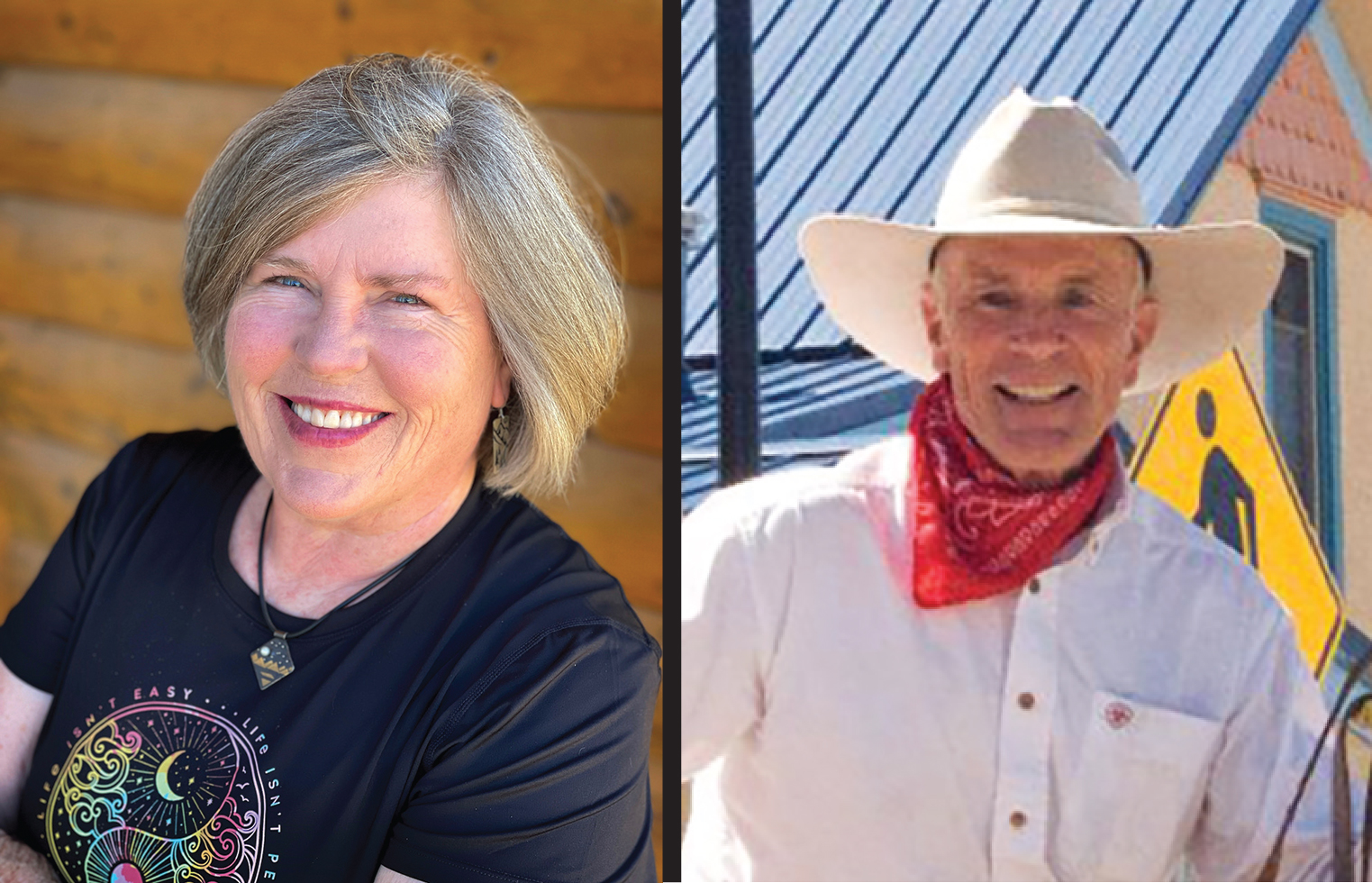Deb Adams
Question: You are one of the first people in Custer County to run as an unaffiliated candidate for Commissioner, what inspired you to run for the position?
As I was reading an article about people who have shaped their communities in positive ways, I felt a strong urge to do more of that in my own community. I feel I have accomplished a lot during my tenure as chair of the Tourism Board, but I felt I could do even more for this community as a county commissioner. This place is heaven on earth. I love and care about this county and I would like to do what I can to preserve what we have and cultivate stronger community bonds.
I believe it is good for a community when citizens have a choice of whom to elect for the office. Mr. Canda ran unopposed in 2018, so I gathered up the courage to run knowing it would be an uphill challenge. I spoke with Clerk and Recorder, Kelley Camper, who informed me how voter registration has been changing. Over the past few years, the number of unaffiliated voters had increased substantially. I have been registered as unaffiliated for over a decade and I believe unaffiliated candidates give voters a true choice. The process to get on the ballot required circulating a petition to get 41 signatures. By the end of June, I had 95 so it was all systems go. Win or lose, this has been a very valuable life experience.
I am an open-minded thinker, and will always consider constructive ideas that address the needs of the county. The job of county commissioner—to manage the business affairs of the county—should be non-partisan to be most effective. I want to return county governance to a civil process. Our community dialog must be conducted with mutual respect despite our differences.

Question: One of the primary jobs of County Commissioner is the financial health of the County budget, which will total over $10 million dollars next year. What plans do you have to improve the financial health of our government finances?
The budgeting process for the county seems to be well managed by Finance Director Braden Wilson and Assistant Director, Lisa Bivins. Budget documents are comprehensive, transparent and readily available on the Custer County government website. It represents Custer County’s commitment to excellence as stewards of county resources.
I was hoping to attend the BOCC budget hearings this month, but they were postponed. I have reviewed the 2022 Budget Summary and have many questions I would like to get answered once I am in office.
In terms of fund balance, the county is healthy. Ending fund balance in 2020 was 59% of revenue. It was budgeted to drop to 50% in 2021, but according to the December 2021 estimate, jumped to about 70% of revenue. The 2022 budget has the fund balance dropping to only 48% of revenue, so I am curious where we are actually right now as there are currently no monthly expense reports posted for 2022. My biggest question about 2022 finances is why 2022 expenses were budgeted with a $612,124 deficit (about 90% of the estimated surplus from 2021). Sure, expenses went up on most accounts, and understandably so in this day and age. But, the “nondepartmental” account was budgeted for 864% above the 2021 estimate—this is over $768,000 more than what was spent in 2021 ($103,399.)
Another concern I have about our financial health is missed opportunities. I recently attended the Small Communities Workshop given by the Colorado Department of Local Affairs (DOLA). Unfortunately, I did not see any of our current commissioners there. I know Commissioners Flower and Day were busy that day with attainable housing reps touring the IndieDwell faculty in Pueblo, but am not sure where Commissioner Canda was. This workshop clearly presented opportunities for local governments to participate in grant programs that benefit communities, and the businesses and citizens of those communities. It is hard work to do research, write the grant requests, and do the follow up. I am prepared to do that work as county commissioner.

Question: Economies are built on the foundation laid by risk-taking entrepreneurs, what will you do to help or encourage new business formation in Custer County?
The Small Communities Workshop confirmed how great communities don’t just happen. There are ways to expand economic opportunities to help our county. We need to think outside traditional methods to invest in the county if we are to encourage entrepreneurs to bring their business ventures here.
As a community, we should make it a priority to help local business owners and our hard-working ranchers be successful. DOLA offers grant programs totaling millions in dollars every year. We need to continue to be an open and welcoming county to tourists who contribute significantly to the vitality of our economy and have done so for decades, ever since the railroad arrived!
The age of our population impacts everything—the economy, the labor force, housing. Who will be our labor force in a decade? We need to make adjustments to provide young, creative individuals and families opportunities to not only find a place to live here, but also the ability to make a living. In order to attract these young harbingers of prosperity to Custer County, we need to create a community vision of sustainable growth and business success.
A solid Economic Prosperity Strategic Plan was created in 2019. It was a community-driven vision for the future, intended to guide the County in implementing goals, priorities and strategies that would directly contribute to its economic development. The top three priorities put forth in this report were: 1) Business expansion, attraction and retention; 2) infrastructure upgrades and maintenance; and 3) tourism development. I would revisit that plan with other civic leaders to determine what strategies we can utilize to enhance the economic development in Custer County, while preserving the quality of life we all love.

Question: What other issues in Custer County would you like to address if you are elected?
I would like to improve community connections; to encourage civil engagement; and to enhance how we work together to cultivate a stronger sense of community. Rivalry serves no purpose. An occasional town hall would provide county citizens a way to participate more in the governing process. County board meetings are bound by the requirement to get county business done within the constraints of time allowed and the current rules in place. Town halls allow people to speak more freely, and would be helpful in building community while engaging more people in discussing county issues and solutions.
The recent housing bubble has affected Custer County as much as other places in the state. Home prices are out of reach for most of the people who work in the Valley, and apartment inventory is very low. We need to develop attainable housing for law enforcement, educators, and service workers. Projects are being undertaken and new lots have been purchased but there is so much more that needs to be considered including grants and additional financing.

Bill Canda
Question: As a Republican Commissioner, what inspired you to run again and what values of the GOP do want to bring to local governance?
I have the opportunity to run one final term, and my purpose in life is serving this community. I love the rhythm of the agricultural year, from calving to haying, to the ebb and flow of the tourist season, to the dreams that are born and grow here, all those things that contribute to the uniqueness of the place we all call home. I want to work wisely and knowledgeably to nurture prosperity so we can continue to be a community where growing families flourish, where arts, culture, and faith complete us, where small businesses and agriculture provide good paying jobs in a community which respects individuals’ rights to live safe and free. It’s imperative to protect our natural resources and be fierce stewards of our water, soil, and our culture. I espouse traditional conservative principles and my personal values include faith, family, freedom, and accountability.

Question: One of the primary jobs of County Commissioner is the financial health of the County budget, which will total over $10 million dollars next year. What plans do you have to improve the financial health of our government finances?
The majority of the revenue collected from taxes is spent on salaries and benefits for the county’s 95 employees and for the Road and Bridge department. The discretionary budget is relatively small. Custer County has a 14 million dollar appetite, but only just over 8 million dollars comes in from tax revenue. We get the rest of the money from grants, donations, and with the help of volunteers. We now have a grant-writing person and we’ve formalized the process to keep track of grants for all departments. We recognize that a small rural county must sometimes take advantage of state and federal grants and other programs set up for communities like ours to fulfill the county’s needs. Commissioners must ensure grants support the professional staff, laborers, building maintenance, etc., and we have to watch this carefully because grant funding is not permanent or guaranteed. My extensive experience managing major programs and leading people gives me the ability to oversee these programs and make sure they run smoothly. Prior to my time as commissioner, the budget process wasn’t user friendly. Our budget process was reactive rather than proactive. Consequently, we’ve modernized our systems and processes. With our new financial system, we are able to conduct accurate budget reviews throughout the fiscal year and managers can make informed decisions in a more timely manner.

Question: Economies are built on the foundation laid by risk-taking entrepreneurs, what will you do to help or encourage new business formation in Custer County? With that question in mind, why did you decide to enact government regulations on vacation rentals that restricted property owners and the myriad businesses that served those rentals?
My stance on this topic is informed and guided by the county’s zoning ordinances and master plan. Because of my professional career background, I was nominated by the other commissioners to be the program manager for the Custer County Economic Prosperity Strategic Plan and the corresponding implementation roadmap to achieve the program’s goals and objectives. The priorities that we developed are 1) Business expansion, attraction, and retention; 2) Infrastructure; and 3) Tourism. We started to execute the plan and were tracking right on schedule for the three priorities when Covid hit us in 2020 and put the process on pause. We need to stay engaged to reach these goals and work within the current Planning and Zoning regulations and water regulations/rights.
I want very much for the citizens of Custer County to be able to use their own property as they see fit as much as possible, and STRs are a vital part of all that. Why does government even get in the way of that at all?
First: State law says any property rented for fewer than 30 days at a time is specially classified as a business, a commercial use of residential property. That makes the property taxable by both the county and the state as a bed tax. This is one important way to get money to run the county from non-residents, tourists, who will also eat in town, go to dude ranches, and otherwise spend money in our county.
Second: Water is the main limiting factor on almost all business and residential uses here in Custer County. It also affects short term rentals. The Planning and Zoning Commission recommends to the county commissioners residences that meet all zoning and short term rental regulations. Short term rental permits in the county are granted as liberally as possible. My view is that as many permits as possible should be granted, with renewal options after a year to make sure that they are operating within the planning and zoning regulations and guidelines. Citizen input is critical at this point, based on facts, not suppositions. In short, these properties must meet our agreed upon county vision and strategic plan.
Most important of all: When you decide who will represent your best interests in county government, you need to have faith that your board of county commissioners will govern by the rule of law, not by favoritism or lack of integrity.
I sincerely believe that my record of service to my God, my country and my home county shows without a doubt that I have this county’s long-term best interests in mind, as well as the spirit and letter of the law with each decision I reach. I will give the benefit of the doubt to all who are trying to make it here, as long as they do not abuse or try to skirt the laws of our county.

Question: Your campaign literature has run on keeping taxes low, yet you proposed a sales tax to fund a Justice Center that would have made the sales tax in Custer County the second highest in the state (9.9%) with Aspen the highest (10.5%). How did this action square with your promise of low taxes?
Let’s look at a breakdown of sales tax here in Custer County: The state rate is 2.9%, the county sales tax rate is 2%, and the two towns each assess an additional 3% which results in a total of 7.9% on purchases within the two towns. If purchases are made in the unincorporated parts of the county, only the state and county taxes apply for a total of 4.9%. The county 2% rate hasn’t changed in decades, whereas the two towns have both recently increased their sales tax rates. County commissioners only have control over the county rate, not the state portion or the rates charged by incorporated municipalities.
With regard to the Justice Center, the only reason those of us on that committee proposed a sales tax to fund it is because the county doesn’t have the capital to pay for a new jail or courthouse which meets safety requirements and other mandates imposed by the state. What was presented to voters was a tax increase to get the project going, although we planned for the bulk of the funding to come from other sources such as grants and donations.
Even though the ballot measure to fund the Justice Center was defeated by voters, our county will still have to determine how to address the current safety issues and make efforts to proactively address state mandates before more expensive solutions are imposed upon us. Fortunately, we have been able to work with the underfunded courts organization and have received four major grants to develop the requirements to upgrade and eliminate the safety issues with the current court and jail. We will continue to explore all avenues to fund the necessary improvements to these facilities.

Question: What other issues would you address if elected again?
I will encourage vocational and life skills training so our youth can grow up and seek good paying jobs here so they don’t have to leave to pursue careers and start their families. I will work with Planning and Zoning to explore the possibility of permitting bunkhouses to be rented out to help alleviate the shortage of affordable housing for younger families who move here as well as foster better hiring and retention for teachers, firefighters, sheriff’s deputies, etc. who are currently priced out of the small number of homes available.
Finally, our hard-working ancestors built a county that mirrored our country’s passion for freedom. I will work hard to keep it that way, to protect citizens’ ability to open businesses, buy homes, or pursue any other dreams here in our community. I want each person here to be free to pursue their own dreams and find success on their own terms. I will continue to work every day to support those dreams and keep our local government out of your way.
Faith, Family, and Freedom!

